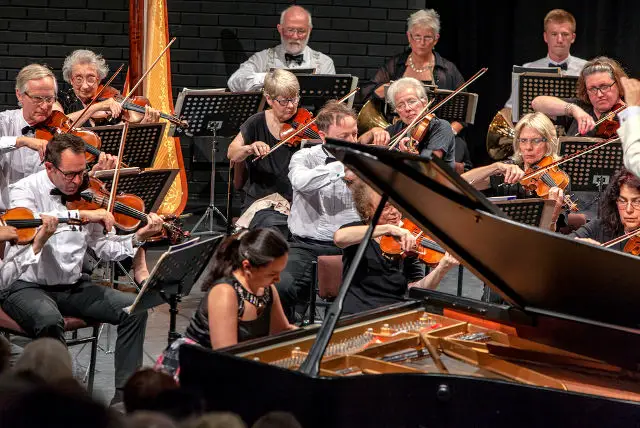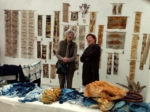Jonathan Dodd shares his review of the latest Isle of Wight Symphony Orchestra (IWSO) concert. Images with kind permission of Allan Marsh. Ed
Last weekend I had the pleasure to attend the last concert of this year’s programme by the inestimable Isle of Wight Symphony Orchestra. It was a hot and steamy night, in the middle of the heatwave we’re either loving or enduring, and the concert hall was equally hot and steamy, but, as is now usual, the house was packed and every seat was sold. I was glad that the male members of the orchestra were allowed to discard their jackets, and I’m sure they were relieved too.
Click on image to see larger version
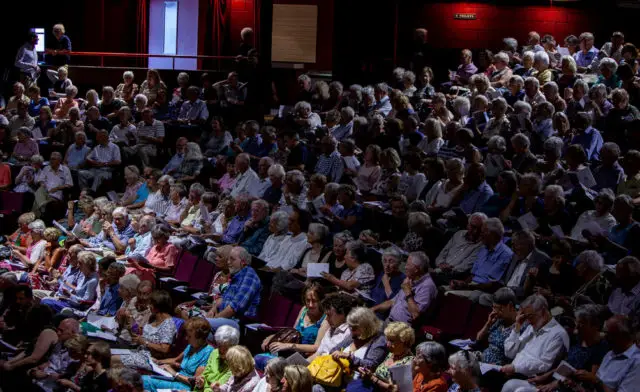
The theme of this last concert was ‘Music featured in famous films’. Not music written for films particularly, but classical music that has been used in film soundtracks. We were treated to a glorious selection, which started with Handel’s ‘Overture for the Royal Fireworks’. Back in the Eighteenth Century the Georgian British loved a good firework display, and George II commissioned his favourite composer, Frideric Handel, to compose some music for one such in 1749.
Pleasure in listening to Handel in full flood
The Treaty of the Austrian Succession, the cause of the celebration, has been largely forgotten, as has the firework display itself, even though it was somewhat unsuccessful, with accidents and burnings and arguments, but the music has lived on, and is familiar to us today. The Overture has been used in many films, including particularly, ‘The Madness of King George’. It was a splendid way to open the concert, with its triumphant and somewhat martial tunes, and its pace.
Click on image to see larger version
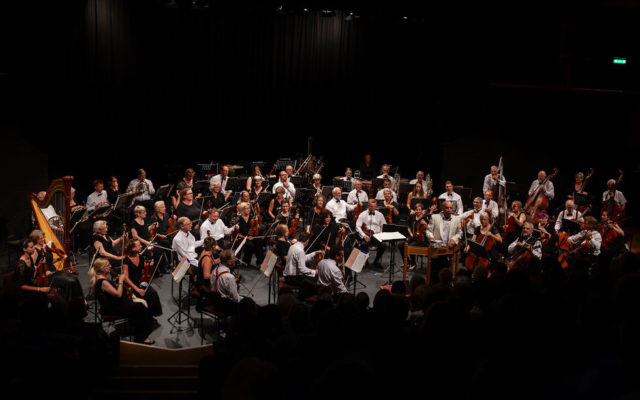
There’s a particular pleasure in listening to Handel in full flood, and in this I like the way that a tune will be begun, and will rise and rise, with the harmonies following, almost like one of those waves which gets tripped up by the water below, and almost stumbles before it breaks. Handel judges and times his waves beautifully, and the music never trips even though I always feel that it might. The orchestra thoroughly enjoyed this piece, and never put a foot wrong. It was a delight.
Not ‘Yokel Cavalrymen’
Next, we were served a piece used in ‘The Godfather’, and countless other films. Pietro Mascagni wrote a one-act Sicilian love triangle opera called ‘Cavalleria Rusticana’ in 1890. It was his only success, and only the Intermezzo has remained well-known. The title means ‘Rustic Chivalry’, rather than ‘Yokel Cavalrymen’, as I thought.
Click on image to see larger version
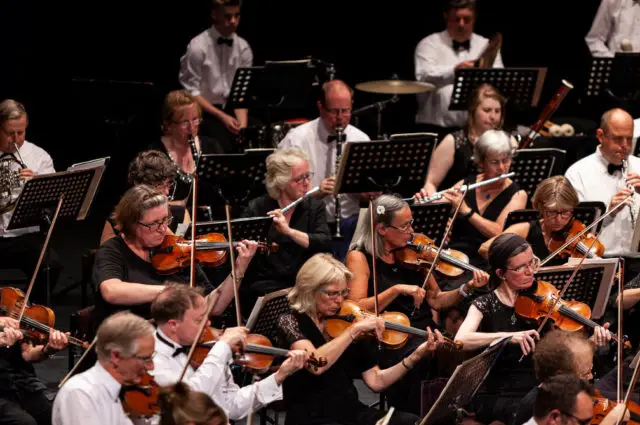
It is a beautiful tune, at once serene and sad, and it is so haunting that there’s no surprise that it keeps cropping up in films. The sweeping strings are particularly effective, and the unrushed plaintive tune is just wonderful. The IWSO played it beautifully.
The most lush and romantic piece of music I can think of
The third piece was an absolute triumph. The orchestra rearranged itself, while a piano was brought in, and the pianist Dinara Klinton walked onstage and settled herself, before storming through Rachmaninov’s Second Piano Concerto.
This concerto was used for the wonderful British film ‘Brief Encounter’, and it is the most lush and romantic piece of music I can think of. It is also fiendishly difficult to play, and right from the start the soloist attacked it and swept everyone up in her playing, audience, orchestra and all. Time seemed to stand still for a while during those amazing three movements.
Click on image to see larger version
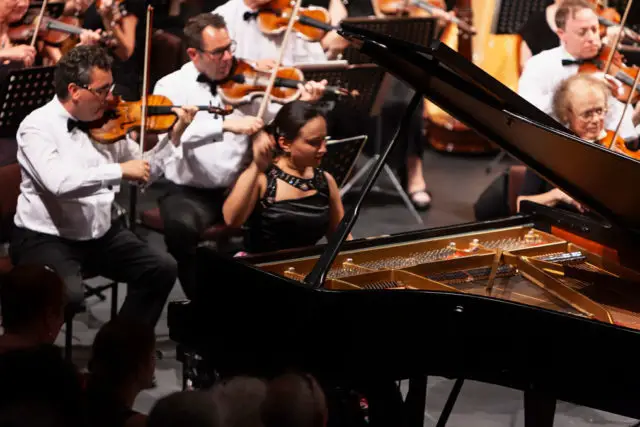
From those ominous first chords, whether playing on her own or with the orchestra, she gave a performance of perfection and grace, despite having to produce notes at a speed that defied belief, and the orchestra was inspired to accompany her brilliantly. Watching, I was surprised at how collaborative this concerto is, with the piano not always playing the main tune, or taking it up and then handing it over to various other instruments in a seamless way. I loved it, I loved how it moved me, I loved its changes of mood, from quiet contemplation to defiance, to despair, and to hope. It was like being on a sea of emotion in the hands of a very skilled sailor. That was special.
Click on image to see larger version
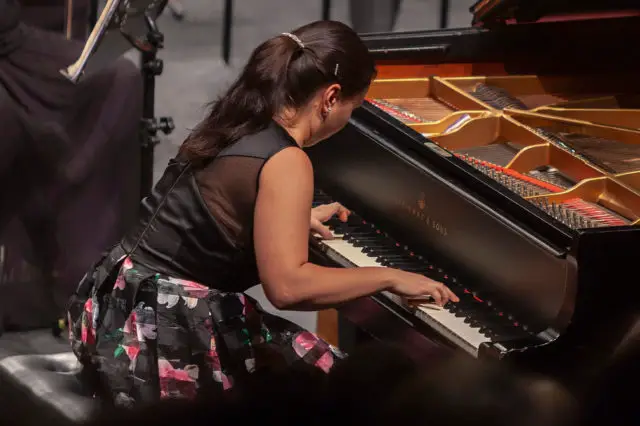
Before the break, Ms Klinton performed an extra piece, by Tchaikovsky, which was exquisite, and also very difficult. I wish I could remember what it was. After that, the interval was welcome, simply because we were all still lost to the Rachmaninov.
‘Things To Come’
After the interval, the concert resumed with a suite by Sir Arthur Bliss, called ‘Things To Come’. This was written specifically for a film of the same name, in 1936. It was one of the first times that a composer agreed to write music specifically for a film. Bliss wrote the music before the film was made, and much of it had to be adapted to fit the footage, and the film was not a success, even though it was adapted from H G Wells’s futuristic dystopian novel ‘The Shape of Things to Come’. The suite has survived, and was performed in a lively fashion by the orchestra. It was an interesting piece, very much in the style of the 1930s.
The most beautiful, yearning, confection of a tune
Next was one of my favourite pieces of music, the Meditation from ‘Thais’, by Jules Massenet. This opera suffered the same fate as the ‘Cavalleria Rusticana’ in that only one part of the original was remembered and loved. It featured in the wonderful and epic film ‘Titanic’. Ostensibly played to allow the main character to make up her mind whether to choose religion or love, it is a short piece for violin and orchestra which was played most beautifully by Matthew Scrivener, IWSO Lead Violin, accompanied by the orchestra.
It is the most beautiful, yearning, confection of a tune, and I’ve never seen it played before, although it is very familiar to me. Mr Scrivener was fantastic, playing with delicacy and controlled hesitation throughout. Lovely.
Satanic and macabre goings-on
The last piece on the programme was ‘Night on a Bald Mountain’, by Modest Mussorgsky. This was featured in ‘Saturday Night Fever’, and I confess to not remembering it from that particular film. But I do remember it from ‘Fantasia’. It’s a sort of retelling of a Russian folk story, involving a coven of witches, meeting on a bald mountain and getting involved in all sorts of satanic and macabre goings-on throughout the night, during lots of bad weather, and concludes with the dawn, the tolling of a church bell, and all of them going home, presumably to cook breakfast.
Click on image to see larger version
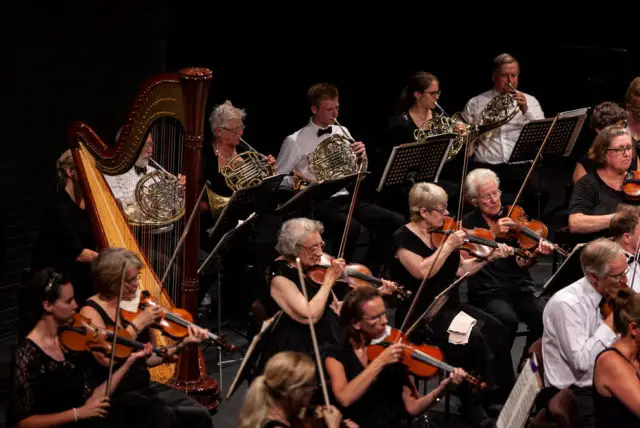
It’s rambunctious, and loud, and a lot of fun to listen to and presumably for the musicians, who were all grinning the whole way through as they gave it their all, despite the heat and exhaustion they must have been feeling. It was terrific.
Jam-packed with musical invention and tunes
For an encore, the orchestra played the wonderful waltz from ‘swan Lake’, as performed by Jamie Bell in ‘Billy Elliot’. This waltz is so familiar, but it always seems to be performed as a background, rather than in and for itself. The remarkable thing about hearing it performed by the orchestra was that I realised it was jam-packed with musical invention and tunes.
Click on image to see larger version
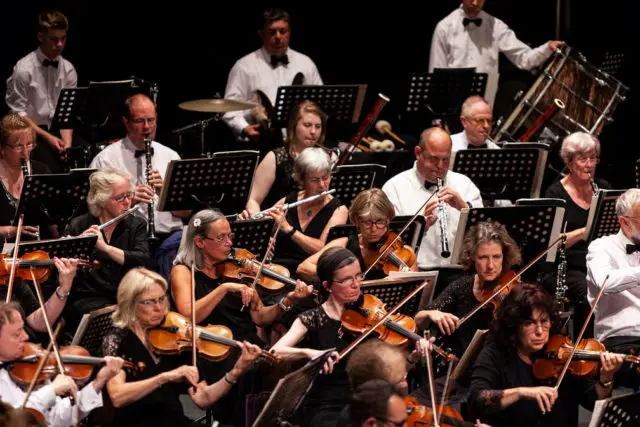
There was so much going on in there that I lost track of all the changes, and the themes, and moods. We remember the tune, but a great performance can allow us to feel the complexity behind it. I shall never hear it so simply again. Brilliantly played.
Great things next season
I went home happy and filled with wonder, and I’m looking forward to the next season.
We’re promised great things, including a Trombone Symphony by Bloch played by former BBC Young Musician of the Year, Peter Moore, and Tchaikovsky’s Violin Concerto, and a Bassoon concerto, and piano Concerto by Prokofiev. There are symphonies by Brahms, and Elgar, and Sibelius.
There are Fantasias, and Overtures, and Rhapsodies, and Preludes and Serenades, and there’s the Planets, by Holst. How fantastic! Get your tickets now. It’s going to be wonderful.
See you there.
Find out more
See the Isle of Wight Symphony Orchestra Website for more detail about season tickets.

